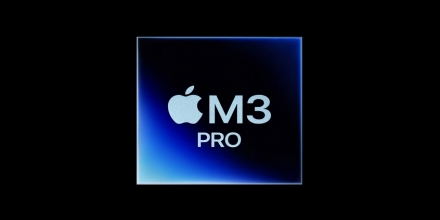Apple's M3 Pro Chip. Incremental gains unveiled in benchmark analysis
05.11.2023 posted by Admin

Apple's latest M3 Pro chip, sporting a 12-core CPU, offers only slightly improved CPU performance when compared to the M2 Pro chip, also with a 12-core CPU. Vadim Yuryev, the co-host of Max Tech's YouTube channel, recently came across a Geekbench 6 benchmark result highlighting this. However, it's crucial to remember that this is just one benchmark, and we need more results for a more accurate assessment.
Apple introduced their new 14-inch and 16-inch MacBook Pro models on Monday, featuring M3, M3 Pro, and M3 Max chips. The benchmark result in question likely pertains to the 14-inch model, indicated by the "Mac15,6" model identifier.
This benchmark reveals that the M3 Pro achieves a single-core score of 3,035 and a multi-core score of 15,173. If these scores hold up, the M3 Pro demonstrates a roughly 14% improvement in single-core performance compared to the M2 Pro, but only about a 6% increase in multi-core performance, particularly for demanding tasks and workflows.
Both the M2 Pro and M3 Pro come with 12-core CPUs, but the M3 Pro's configuration consists of six high-performance cores and six efficiency cores, in contrast to the M2 Pro's eight high-performance cores and four efficiency cores. Despite being manufactured using TSMC's more advanced 3nm process (versus the M2 Pro's 5nm), the performance gains of the M3 Pro are hampered by its two fewer high-performance cores. Furthermore, the M3 Pro boasts 25% less memory bandwidth and one fewer GPU core when compared to the M2 Pro.
By limiting the number of high-performance cores in the M3 Pro, Apple has created more differentiation between the M3 Pro and the M3 Max, which boasts up to 12 high-performance cores. Nonetheless, this means that the M3 Pro only offers marginal improvements over the M2 Pro.
Earlier Geekbench 6 results from this week demonstrated that the M3 Max outperforms the M2 Max by up to 45%, while the standard M3 chip outperforms the standard M2 chip by up to 20%. Consequently, the M3 Pro stands as the least impressive chip in the series. Nonetheless, it represents a substantial upgrade for those transitioning from an Intel-based Mac. Notably, the M3 Pro delivers performance up to 20% better than the M1 Pro chip, which is a noteworthy advancement.
Remember that benchmarks offer valuable insights, but real-world performance can differ significantly.
The new MacBook Pro models are currently available for ordering, with M3 and M3 Pro configurations set to be delivered and released in stores on Tuesday, November 7. M3 Max configurations will be introduced later in November.
Apple introduced their new 14-inch and 16-inch MacBook Pro models on Monday, featuring M3, M3 Pro, and M3 Max chips. The benchmark result in question likely pertains to the 14-inch model, indicated by the "Mac15,6" model identifier.
This benchmark reveals that the M3 Pro achieves a single-core score of 3,035 and a multi-core score of 15,173. If these scores hold up, the M3 Pro demonstrates a roughly 14% improvement in single-core performance compared to the M2 Pro, but only about a 6% increase in multi-core performance, particularly for demanding tasks and workflows.
Both the M2 Pro and M3 Pro come with 12-core CPUs, but the M3 Pro's configuration consists of six high-performance cores and six efficiency cores, in contrast to the M2 Pro's eight high-performance cores and four efficiency cores. Despite being manufactured using TSMC's more advanced 3nm process (versus the M2 Pro's 5nm), the performance gains of the M3 Pro are hampered by its two fewer high-performance cores. Furthermore, the M3 Pro boasts 25% less memory bandwidth and one fewer GPU core when compared to the M2 Pro.
By limiting the number of high-performance cores in the M3 Pro, Apple has created more differentiation between the M3 Pro and the M3 Max, which boasts up to 12 high-performance cores. Nonetheless, this means that the M3 Pro only offers marginal improvements over the M2 Pro.
Earlier Geekbench 6 results from this week demonstrated that the M3 Max outperforms the M2 Max by up to 45%, while the standard M3 chip outperforms the standard M2 chip by up to 20%. Consequently, the M3 Pro stands as the least impressive chip in the series. Nonetheless, it represents a substantial upgrade for those transitioning from an Intel-based Mac. Notably, the M3 Pro delivers performance up to 20% better than the M1 Pro chip, which is a noteworthy advancement.
Remember that benchmarks offer valuable insights, but real-world performance can differ significantly.
The new MacBook Pro models are currently available for ordering, with M3 and M3 Pro configurations set to be delivered and released in stores on Tuesday, November 7. M3 Max configurations will be introduced later in November.